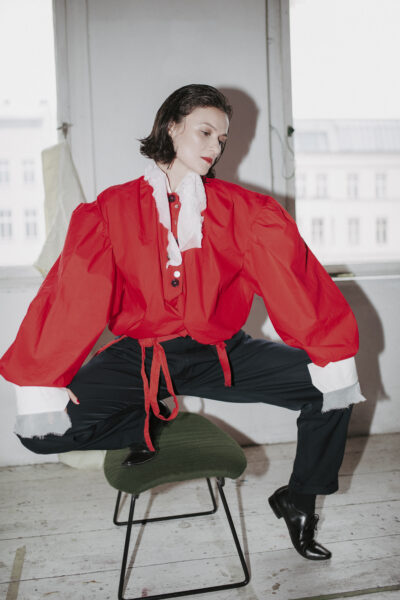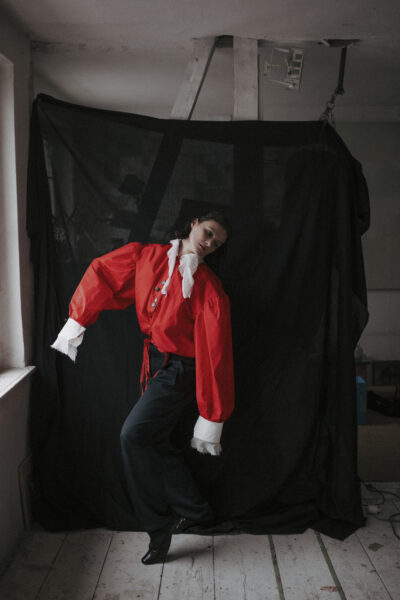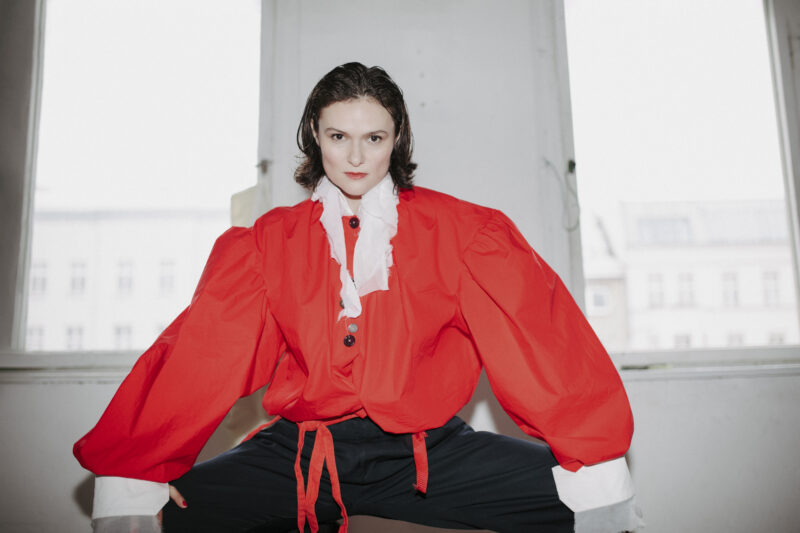The striking debut album of Polish-German singer, songwriter, producer and performer Edita Karkoschka who goes by the fitting stage name KOSCHKA is a collection of eight songs, ranging from interpretations of the Lied, stemming from German Romanticism which was the dominant intellectual movement of German-speaking countries in the late 18th and early 19th centuries, to epic and stunning alt-pop tracks. Never conforming, always challenging and definitely rewarding.
Her self-titled album has come a long way. After her previous band, the Dutch indie pop outfit Nausica, had disbanded, the Berlin-based singer waited through lockdowns and pregnancy for the right momentum to complete her long overdue solo album. Finally, it dropped and with it another one of her one-shot videos in collaboration with Belgian pop photographer Tom Roelofs.
You are releasing your self-titled debut LP KOSCHKA on the 29th of March 2024, but I would definitely not describe you as a newcomer. What took you so long to get your album into gears? What circumstances came with the process?
KOSCHKA is my solo project, which I already performed here and there as a contrasting program when I was still intensively on the road as the front woman of the Dutch-German indie pop band Nausica. With my move from Holland to Berlin at the end of 2015, and finding my way in a German music world, which is really different from the Dutch scene, I felt the need to give KOSCHKA more space. Starting with the first recordings such as the song “The Flood”, a 7-minute song that was created casually in the early morning with a coffee in my hand and a microphone in front of my nose, the desire to record an album developed more and more.
It was only with the support of the Berlin studio Zodiaque (Dota, Max Prosa) that I had the courage to record my music, mostly at my home studio in Berlin Neukölln. I took my time to grow as a producer, I had to make many decisions by myself, and above all I wanted to follow my gut completely. With COVID, the birth of my first child at the beginning of 2021, and the vision of creating a platform that continues to serve my musical development beyond its release, I only released it now.

Photo by Dovile Sermokas
For Myself
With Nausica you made a dent in the European music scene in the late 2010s. Listening to the songs now, it is puzzling why you were quite overlooked and underestimated. What are your learnings from that time? What are your feelings looking back?
That is a difficult question. We were in a good place when we split up, but we lacked the management at the time to take us one step further. We had a great booking in the Netherlands and were just starting out with PopUp Records in Germany. Despite the equal division of different roles and tasks, I noticed a certain wear and tear over the years. It manifested in that I rarely started writing songs for Nausica myself.
With KOSCHKA it’s different. I can be completely free in how I express myself in a new piece. Song sketches often come about in passing. On my bike, lying in a field in France, doing everyday things. However, the fact that I played in a band for a long time influenced how I express music. Even if it’s sad or melancholic, it has to radiate a certain power and energy. I look back on the time with Nausica very fondly and we are all still in contact with each other.
Do you miss playing in a band?
Not really at the moment. I find it exciting to be able to put on a show all by myself. As a solo artist, I transfer a song to my audience with freedom in tempo, intensity, and interpretation at every show. I’ve been on tour for the last couple of weeks. I’m looking forward to my record release show in Berlin on the 19th of April at Club Ausland. However, at some point, I will bring in guest musicians or maybe even a whole band.
Spotlight
Your voice has a haunting quality. It is very recognizable and reminds me of the great 80s Icon Desireless as well as the British singer and songwriter Tracey Thorn from Everything But The Girl. You also reference PJ Harvey. This is not a real question more a declaration of love to your tone and the soulful vibrance you ooze. Do you need to take very good care of your voice or are you secretly moonlighting in a screamo band?
Thank you for the comparisons. I’m happy to accept them even though I rarely compare myself. But no, I don’t play in a screamo band. I even had to google to make sure I knew the term. I have a great love for experimenting with the voice as an instrument. Exploring that, I took part in various projects in the past. At a trash noise opera by a Czech composer, I embodied the persona of Patricia Paay. In 2020, I participated in a project called “the porous opera” with a group of philosophers from Berlin. Together, we performed an evening at the UT Connewitz and I improvised many lyrics a cappella.

Photo by Dovile Sermokas
I find experimentation tempting and see this as a large part of my artistic expression that I like to incorporate into my music. I think it would be wonderful to get involved in a noise project and at other times to decide to go straight for pop music or a cliché.
KOSCHKA is your alter ego on stage. Is it necessary for you to distinguish yourself from your private self when you step on stage?
I think that happens naturally. The stage name is more rooted in the vision of the effect I want my music to have. This vision is visually anchored in the way I produce my music. I think light, for example, is an incredibly important partner on stage.
You mention light as a partner on stage. Another striking visual of your shows is the outfits you wear. How important is stage clothing for you? Do they decide about the tone of the concert?
A stage look that is associated with a certain vision, as described above, is somehow part of it for me. But I often have the feeling that, especially in Germany, people don’t dare to dress up on stage. For me, fashion is an art form of expression just like painting or music. It’s crazy what power it has in society – often so unconsciously. I don’t try to hide in a dress. I look for the underlining and fusion with the music and take the courage to experiment also visually.
Romanticism
The lyrics of your songs are often very melancholic. Are these emotions you lived yourself and poured into your songs or do you have an excellent empathy when it comes to the depths of longing for something or someone?
It is for sure both. There’s this completely new piece I wrote after the album, but which I’m already trying out at live gigs. It came about very casually. I found a sketch of a song, I think I recorded it in the middle of summer in France in a field in the Auvergne. When I heard this sketch again, I saw a fierce image in my head that was directly related to the emotional world of the people living in the Ukraine war.
A couple is lying close together on a field bed, in a bunker. The sound of bombs in the fog from outside. It echoes. These feelings and the time we live in always play a part. When a song is finished, it doesn’t matter to me whether it comes from my personal life or was created that way. It no longer belongs to me. It should tell the listener a story, and it should become their own on a new level.
Some songs are sung in German and they are covers, which for non-German speakers may come as a surprise. But fans of classical music might pick on your love for the Lied, the German version of a pop song from the Romantic era. This is quite a journey from your indie disco days with Nausica. You said you dug back into songs from your childhood and did extensive research when choosing those songs. Is there another epoche that would interest you as well to dive into?
It’s so much a different era but rather individual pieces. I am working on a piece from the Carmen opera in French, for example, as well as a piece by Gustav Mahler that a pianist friend of mine recommended to me. It is called, “Ich bin der Welt abhanden gekommen”. At some point, I will definitely also sing a Polish song. I haven’t done that in a long time. Apart from that, I approach these things in an unabashedly naive way. Something has to inspire me, only then do I go all in and do my work.
KOSCHKA is out now via St. Vladimir.



